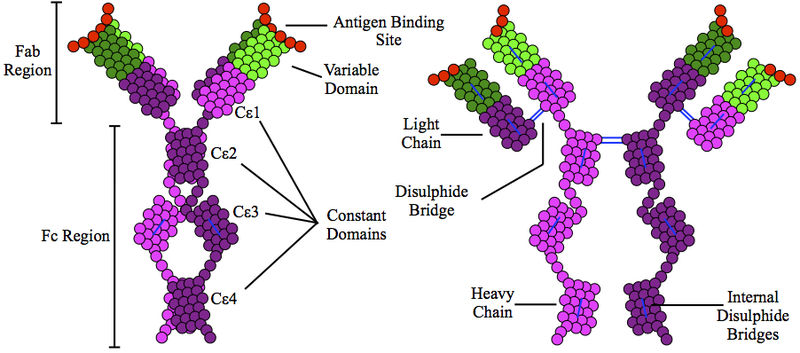The Science Behind Peanut Allergies
- Jennica Lee

- Aug 11, 2025
- 3 min read
Recently, peanut and tree nut allergies have emerged as a serious public health issue, as it has been shown that the number of people who develop peanut allergies is increasing. About 1-3% of Americans are allergic to peanuts and tree nuts.
What is an allergy?
A food allergy is when the body overreacts to a certain protein in the food and activates the immune system. An antibody called immunoglobulin E, or IgE is triggered. The IgE, which is specific to an allergen, attaches itself to the surface of mast cells. The body becomes sensitive to that allergen, resulting in an inflammatory response every time they ingest or are near the food. Karl Nocka, Associate Research Fellow in Pfizer’s Inflammation and Immunology Research Unit in Cambridge, states that food allergies are likely the result of one’s genetic makeup and the immature state of the immune system of an infant. A study conducted in 2015 showed that introducing peanuts early to the diet of an infant who is at a greater risk of developing a peanut allergy significantly reduced the chance of developing one as well as the immune response to peanuts.
The Role of IgE and B Cells

Image from Wikipedia (https://en.wikipedia.org/wiki/Immunoglobulin_E)
IgE is “a key step into causing allergies.” Antibodies like IgE are produced by an immune cell called a B cell, and the memory subtype of the B cell aids the immune system in remembering past threats for the future. It is interesting that some food allergies, such as most peanut and tree nut allergies, last all of one’s life because B cells are typically rare. However, a study by Lafaille demonstrated that rodents store allergen information in a different type of B cell that produces an antibody called IgG. When IgG is activated, those B cells transform into cells that are able to produce IgE antibodies. Lafaille and her colleagues conducted a second study and concluded that children with peanut allergies had a higher number of memory B cells marked with CD23, a protein found on the surface of B cells that produce IgG. Furthermore, the amount of CD23 B cells in the child was directly proportional to the level of IgE reactive to peanuts in their blood.
Symptoms
Now that we’ve covered the inner workings of allergies at a micro level, we will discuss how these antibody triggerings manifest in the form of symptoms. Ingesting or breathing the air near peanuts can result in a wide range of symptoms, from a stomach ache and a runny nose to anaphylaxis, which occurs when the body releases a variety of chemicals into the blood and causes the body to become hypersensitive. Anaphylaxis can manifest itself through a variety of severe symptoms such as hives, throat swelling, difficulty breathing, and vomiting. It can potentially lead to death if left untreated. A severe allergic reaction requires that the individual carry an EpiPen or allergy medicine in case of an emergency.
Why Peanut Allergies Rarely Disappear
Though scientists have stated that early exposure to peanuts and tree nuts as an infant decreases your chance of developing an allergy, it is not common that a peanut or tree nut allergy goes away once it has developed. Studies have shown that only 20-25% of children with a peanut allergy outgrow it. 80% of those children outgrow the allergy by age 8. This means that most people with peanut or tree nut allergies will have to learn to manage the condition lifelong.
Treatment Options and Management
While you may simply avoid the harmful food altogether, there are treatment options such as oral immunotherapy treatments, which desensitize the patient to the allergen until they are able to eat the problematic food with little to no reaction.
Whether you intend to undergo treatment or simply learn to manage the allergy, it is important to always be cautious of what you eat and be aware of how to use an EpiPen and have access to allergy medication in case of an emergency.
Written By: Jennica Lee
References
Doctor, Atlanta Allergy. “Can a Peanut Allergy Go Away?” Chacko Allergy, 25 Apr. 2024, atlantaallergydoctor.com/blog/can-a-peanut-allergy-go-away/.
“Science Fact or Science Fiction? Avoiding Peanuts as an Infant Reduces Allergy Risk.” Pfizer, www.pfizer.com/news/articles/science_fact_or_science_fiction_avoiding_peanuts_as_an_infant_reduces_allergy_risk. Accessed 6 Aug. 2025.
“The Science behind Peanut Allergies: Blog: Science Museum of Virginia.” Science Museum of Virginia | For Curious-Minds of All Ages!, smv.org/learn/blog/science-behind-peanut-allergies/. Accessed 6 Aug. 2025.
Kreier, Freda. “Peanut Allergy May Hold Clues to Other Food Allergies, Study Finds.” Yale School of Medicine, Yale School of Medicine, 9 Feb. 2024, medicine.yale.edu/news-article/peanut-allergy-may-hold-clues-to-other-food-allergies-study-finds/.




Comments